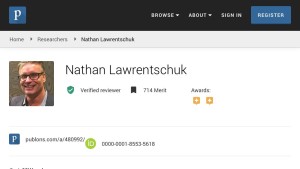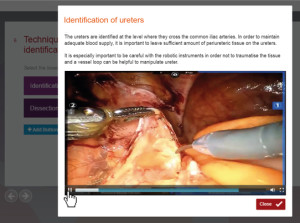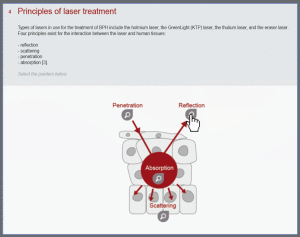Publons: Giving Credit For Peer Review
 Peer reviewing of journal articles may be one of the most unheralded and feel at times as the least rewarded of continuing medical activities we do. People give time, expertise and judgement to make articles of a higher scientific standard and are crucial to the nature of medical publishing. As an Associate Editor of the BJUI, I am aware of the significant contribution reviewers make. I also review myself for many journals. For me it is one of the best forms of learning we have available to us. This was made even more apparent at the recent peer-reviewing workshop just prior to the EAU in Munich, where reviewers were delighted to learn of the possibility of a verifiable metric of reviewing.
Peer reviewing of journal articles may be one of the most unheralded and feel at times as the least rewarded of continuing medical activities we do. People give time, expertise and judgement to make articles of a higher scientific standard and are crucial to the nature of medical publishing. As an Associate Editor of the BJUI, I am aware of the significant contribution reviewers make. I also review myself for many journals. For me it is one of the best forms of learning we have available to us. This was made even more apparent at the recent peer-reviewing workshop just prior to the EAU in Munich, where reviewers were delighted to learn of the possibility of a verifiable metric of reviewing.
Most journals provide recognition of peer-review work by publishing lists of reviewers, often collating CME credits and points or even the ability to provide a letter of reference when asked.
Third-party collation and recognition of peer-review work has until recently been lacking. This means to ‘prove’ one has indeed reviewed for a journal we would have few options apart from possibly saved emails thanking us for our good work. Publons has many aims but chief is to do just that – provide a platform where there is authenticity and recognition for peer review.
How to do it?
- Go to www.publons.com
- Register (free)
- Upload a photo, short biography and your academic affiliations (Figure 1 and 2)
- Enter in your editorial board positions (the Journals you have reviewed for will be added by Publons once verified – Figure 3)
- Add reviews
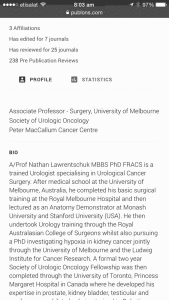 The final point of adding reviews has been made relatively easy – it is automated and quick.
The final point of adding reviews has been made relatively easy – it is automated and quick.
The official emails you have received over the years (which of course you carefully filed away…) stating “thank you for your review of the journal article entitled … Manuscript number …‘ just need to be forward to [email protected]
This will then, within a few days, be placed into the system. You will get an email notification. The partner publishing organizations (e.g. Nature publishing group) have their logo which makes it look all the more official (Figure 3)
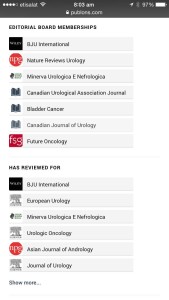 Now for those of us who have not kept all of the ‘thank you’ emails, a second way is to go to each journal you have reviewed for, log in to the reviewers dashboard. Take screenshots and send as a JPEG (be careful to include your name as part of screenshot for verification). This may take a small fiddle to cut and paste to a word document if you have multiple shots. You can then send as PDF or photo etc. Again email the attachment to [email protected]. The website has provided rules on the types of proof or verification they will accept but they are pretty open to suggestions if there is an issue.
Now for those of us who have not kept all of the ‘thank you’ emails, a second way is to go to each journal you have reviewed for, log in to the reviewers dashboard. Take screenshots and send as a JPEG (be careful to include your name as part of screenshot for verification). This may take a small fiddle to cut and paste to a word document if you have multiple shots. You can then send as PDF or photo etc. Again email the attachment to [email protected]. The website has provided rules on the types of proof or verification they will accept but they are pretty open to suggestions if there is an issue.
The review records are collated (Figure 4) and then a chance to upload your review. This type of open access is only in its infancy and not mandatory.
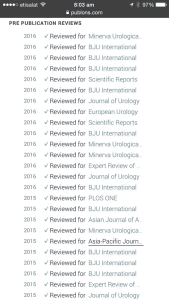 To make it more interesting there are award merits, which are a nice touch. Each review gets you three merits. Prizes are awarded quarterly and displayed on your profile page (Figure 1). They are categorical or may be within your country or university. Remember in this environment everyone doing peer review is represented so you are up against engineers, theologians and the like in some categories. The opening of reviews with ‘extra merit points’ available, although noble, is unlikely at this stage to have uptake. The peer-review process is fragile enough and this may need to be reworked. Perhaps “open review” bonus merit points could be separated out as it seems unfair to penalise reviewers as most are single or double blinded in any case and will not wish to open. Publons goals of promoting discussion and interaction are fine but after having spent time doing the reviews and not getting remuneration, it is somewhat counterintuitive to want to take more of your valuable time on a review – but it may suit some (read more on history of Publons here)
To make it more interesting there are award merits, which are a nice touch. Each review gets you three merits. Prizes are awarded quarterly and displayed on your profile page (Figure 1). They are categorical or may be within your country or university. Remember in this environment everyone doing peer review is represented so you are up against engineers, theologians and the like in some categories. The opening of reviews with ‘extra merit points’ available, although noble, is unlikely at this stage to have uptake. The peer-review process is fragile enough and this may need to be reworked. Perhaps “open review” bonus merit points could be separated out as it seems unfair to penalise reviewers as most are single or double blinded in any case and will not wish to open. Publons goals of promoting discussion and interaction are fine but after having spent time doing the reviews and not getting remuneration, it is somewhat counterintuitive to want to take more of your valuable time on a review – but it may suit some (read more on history of Publons here)
In time it is likely that Publons will become the Pubmed for peer reviewers. Relationships will form with publishers and hopefully it may become a network for peer reviewers and a tool for handling editors. Overall a wonderful initiative and a great step to recognize and hopefully enhance peer review, which is a sacrifice many of us make – but for the good of medicine!
Nathan Lawrentschuk, University of Melbourne, Australia
@Lawrentschuk


